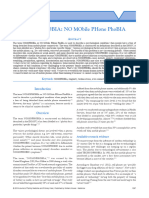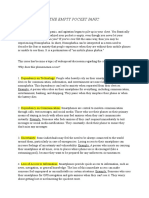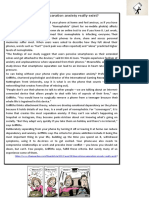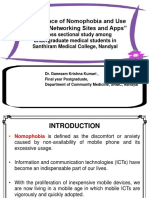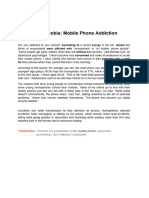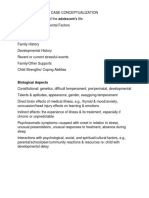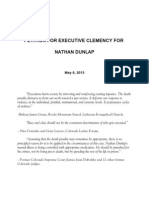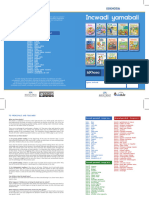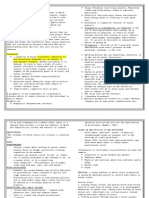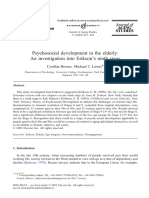Nomophobia—short for "no mobile phone phobia"—is a modern psychological condition
characterized by an intense fear or anxiety of being without access to a mobile phone or losing
connectivity. Coined in 2008 during a UK study, the term reflects the growing dependence on
smartphones in daily life. (Wikipedia)
Symptoms
Individuals experiencing nomophobia may exhibit:(Government of Saskatchewan)
Emotional symptoms: Anxiety, panic, or distress when separated from their phone, or
when facing low battery, no signal, or lack of internet access.(Wikipedia)
Behavioral symptoms: Constant checking of the phone, carrying chargers or backup
devices, and avoiding situations where phone use is restricted.
Physical symptoms: Sweating, trembling, shortness of breath, or rapid heartbeat when
unable to use the phone.
These symptoms can interfere with daily activities and relationships.
Causes
Several factors contribute to the development of nomophobia:
Psychological factors: Low self-esteem, social anxiety, or a need for constant
reassurance can drive excessive phone use.
Behavioral patterns: Over-reliance on smartphones for communication, information,
and entertainment reinforces dependency.
Societal influences: The pervasive integration of mobile technology into work and social
life increases the perceived necessity of constant connectivity.
Diagnosis
While nomophobia is not officially recognized in the Diagnostic and Statistical Manual of
Mental Disorders (DSM-5), mental health professionals may assess it based on:(Medical News
Today)
The severity and duration of anxiety related to phone absence.
The extent to which this anxiety disrupts daily functioning.(Healthline)
Assessment tools like the Questionnaire of Dependence of Mobile Phone (QDMP) can aid in
evaluating the condition. (Wikipedia)
�Treatment
Effective treatment strategies for nomophobia include:
Cognitive Behavioral Therapy (CBT): Helps individuals identify and challenge
irrational thoughts related to phone dependence.
Exposure Therapy: Gradual exposure to situations without phone access to reduce
anxiety responses.
Medication: In some cases, anti-anxiety medications or antidepressants may be
prescribed to manage symptoms.
Mindfulness and relaxation techniques: Practices like meditation and deep breathing
can help manage anxiety associated with phone absence.
Coping Strategies
To manage nomophobia, individuals can:
Set boundaries: Designate specific times and areas where phone use is limited or
prohibited.
Engage in offline activities: Pursue hobbies or social interactions that do not involve
digital devices.
Practice digital detox: Periodically disconnect from digital devices to reduce
dependency.
Seek support: Talk to friends, family, or support groups about challenges and strategies
for reducing phone reliance.
Implementing these strategies can help individuals regain control over their phone usage and
alleviate anxiety related to disconnection.(Verywell Mind)
If you or someone you know is struggling with nomophobia, it's important to consult a mental
health professional for personalized guidance and support.




